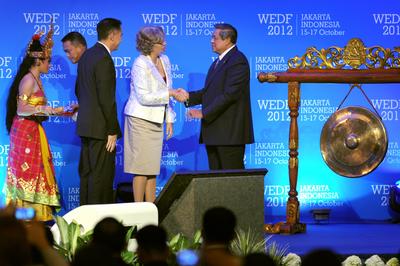whether the country should continue to pursue an export-led growth strategy. The fact is that Indonesia needs exports, and returning to unilateral liberalisation should be the first move to further Indonesia’s growth. In recent years Indonesia has removed restrictions on trade, investment and production, and streamlined procedures at the border. The resultant increase in efficiency has allowed Indonesia to reduce tariffs to an average of less than 10 per cent. Indonesia’s average tariff was lower than that of several countries in Asia in 2006–08, and lower than the East Asian average.
But while tariff rates have fallen or remained stable, non-tariff barriers to trade have flourished. In the agriculture sector, for example, sensitive products are subject to special import licensing. And in the case of rice, cloves and salt, only domestic producers can apply for a license. Indonesia continues to ban imports of chicken parts and imposes restrictions on the amount of meat and poultry products that can be imported. Restrictions are also prevalent in the mining sector.
So why are indirect protections increasing? Though some point to a profit-seeking political economy model, the reality is considerably more complex. The real exchange rate provides a partial explanation (that is, a real appreciation can increase the demand for import protection), but the struggle for power among competing interest groups must also be examined. It is important to look at the distributive consequences of trade reform, that is, who gains and who loses from trade protection.
In general, technocrats are strong proponents of reform, but there are only a few technocrats in the cabinet — and they are not always in agreement. Politicians are often ambivalent about trade reform: they will support it so long as it strengthens their political position, but will reject it once it becomes unpopular. As for the bureaucracy, its members on the whole tend to support the status quo. Indonesian civil society is widely divided on the issue of globalisation, and the media and NGOs tend to oppose it. The ambivalence or outright opposition of most political actors to unilateral trade reform makes implementing these reforms very difficult. Apart from political barriers to change, Indonesia also faces a decline in competitiveness due to supply-side constraints and the possibility of economic slow-down in response to the euro debt crisis. So Indonesia will find it increasingly difficult to remove trade barriers by itself, especially as other countries resort to protectionism.
Does this mean Indonesia will retreat from trade reform? There are two reasons why it will not: first, Indonesia is committed to the provisions of the WTO and to regional trade agreements, including the ASEAN Free Trade Area (AFTA) and the ASEAN–China Free Trade Area. Second, Indonesia does not want to miss out on the advantages of ‘competitive liberalisation’, because if it does not participate in trade agreements, it may suffer as a result of trade being diverted elsewhere.
Indonesia’s trade policy is not made in a vacuum: it depends upon multilateral and regional trade agreements. Indonesia is a member of the WTO and a strong supporter of its Doha Development Agenda. It plays important roles in APEC and ASEAN, and was a key actor in the establishment of AFTA. Indonesia also supports the development of ASEAN+ agreements. At the same time, it engages with individual countries to establish cooperation in the form of free trade areas and preferential trade agreements (PTAs).
Still, Indonesia’s enthusiasm for free trade areas may not lead to significant reform. Even when negotiations are successful, few free trade area schemes actually lead to liberalisation. There are three factors that contribute to their moderate success: first, states have not taken full advantage of free trade area facilities. Second, when states negotiate to join free trade areas, they might take resources and momentum away from agreements made through the WTO. Third, free trade areas are prone to overlap, and this can create highly complex conflicts among rules of origin — the ‘spaghetti bowl’ effect.
Further unilateral liberalisation is not easy in an environment of creeping protectionism, and the agenda is still in limbo with the Doha Round of negotiations stalled. So Indonesia must rely on free trade areas and PTAs for trade liberalisation. If it follows three simple rules, though, it can achieve a great deal from trade with other countries, even in the current environment.
First, free trade areas should not discriminate against Indonesia’s WTO partners. Second, engagement in any trade arrangement with foreign partners should be accompanied by efforts to improve the quality of institutions at home. Third, when progress has been made on the supply side, Indonesia must return to unilateral liberalisation. The challenge, however, is big. The pressures for trade protection, especially amid the global crisis, will not subside soon. The complex tug-of-war between the pro and anti-trade reform groups is likely to continue.
M. Chatib Basri is Senior Lecturer at the Department of Economics, University of Indonesia.
Arianto A. Patunru is a Fellow of The Indonesia Project at the Arndt-Corden Department of Economics, Australian National University.
This is an abridged version of a co-authored paper published in the Bulletin of Indonesian Economic Studies 48(2), in August 2012.

